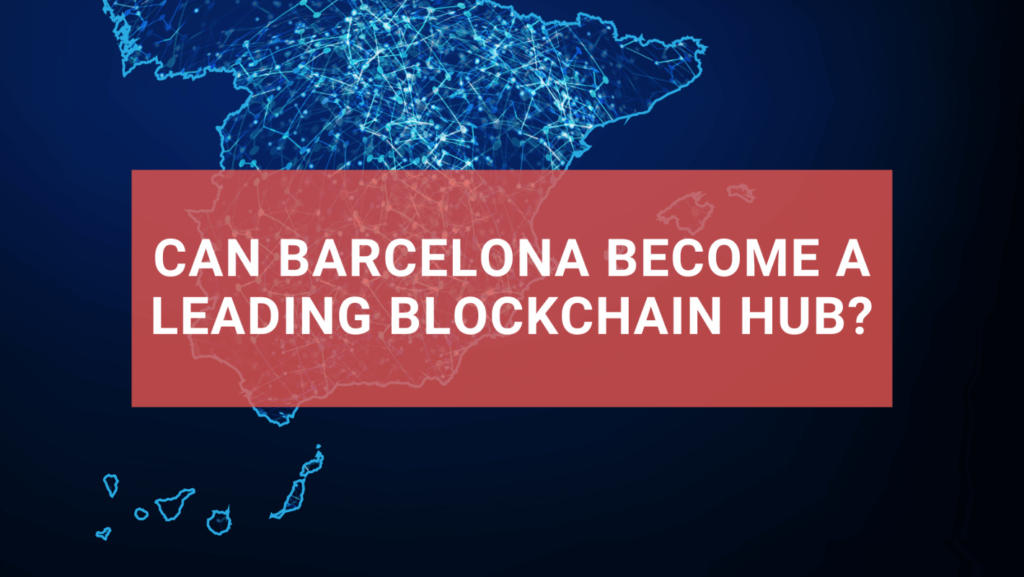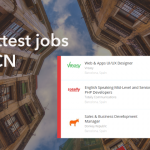
This is a guestpost by GLOCAL students from the University of Barcelona – Jonny Amon, SzuTung Chen, Spencer Long & Ilayda Tenim – based on a report they made during their internship at PEMB.
We can all agree that Barcelona has emerged as an international hub for tech startups in Europe. Between the city’s investment in various collaboration groups, a growing network of startup entrepreneurs, and an emergence as an educational stronghold offering new, modern programs, Barcelona has shown it takes its startup scene seriously. Our research categorically analyzes different key players in the industry to showcase what is currently being done and how the Barcelona government can position itself to be a leader in the field.
Barcelona blockchain hub: The key players
The Generalitat de Catalunya approved the Catalan Blockchain Strategy in June 2019, intending to put Barcelona at the forefront of the use and development of blockchain technologies. As of now, it has also been proactive in spurring growth: the government established Barcelona Activa in 1986 to operate a large incubator across the 22@ innovation district, assisting young startups to grow from early-phase to revenue-generating companies. It also founded Acció to provide resources and consulting services for foreign companies that plan to start a business in the city.
Barcelona has established itself as a European powerhouse, largely thanks to the investment across all actors within the landscape, and the accelerators have become commonplace across the city. We analyzed how the government, non-profits, private companies, and universities support the growing Barcelona blockchain scene and discovered that many startups are drawn to the city because of the commitment of various institutions to help the scene grow.
In the higher education space, several universities in Barcelona are offering courses and even degrees in blockchain technology, connecting young talents with the industry. In addition, universities have also become important players in the development of blockchains through various incubation projects, seeking to advise students on startups focused on blockchain technologies. There are also various research institutions dedicated to promoting, explaining, and educating citizens about blockchain technology, such as the Centre Blockchain de Catalunya (CBCat), EURECAT, I2CAT, and Centre Easy.
We also identified several local financial resource providers; private money supplied over half of the funding. Many international banks, organizations, and private investors offer loans, microloans, or funding for startups. At the same time, some Barcelona universities provide Business Angel investment packages to support upcoming projects. Below, we include a table of the key actors in the Barcelona blockchain industry.
| University Degrees | • Universitat de Barcelona • Universitat Politècnica de Catalunya · BarcelonaTech (UPC) • Escuela de Negocios de la Innovación y Los Emprendedores (IEBS) • Institute for Advanced Architecture of Catalonia • UIC Barcelona |
University Programs | • Universitat de Barcelona – StartUB • Universitat Autònoma de Barcelona – PRUAB • Universitat Pompeu Fabra – TecnoCampus |
| Research Institutions | • Centre Blockchain de Catalunya (CBCat) • EURECAT • I2CAT • Centre Easy |
| Accelerators and Logistics Help | • Barcelona Activa • ACCIÓ • Barcelona Global • Tech Barcelona |
| Financing | • International Banks (e.g. CaixaBank, BancSabadell, BBVA) • Microloans (e.g. MicroBank) • Private Investors (e.g. Caixa Capital Rise) • University Investments (e.g. ESADE Business Angels Network, IESE Business Angels) • Individual Private Equity and Venture Capital Firms (e.g. Inveready) |
Promising blockchain applications in Barcelona
While technology and blockchain find themselves in every sector of the economy, we placed additional emphasis on two segments that we believe have the opportunity to make a positive impact on the everyday lives of Barcelona citizens. In our research, we examine the existing companies in the urban mobility and supply chain industry, identify the current challenges in Barcelona, provide recommendations to ensure their continued growth, and pinpoint the possible hurdles when integrating blockchain into these two sectors.
Next, we detail the main findings and how Barcelona can benefit from using blockchain technology in urban mobility and supply chain management.
Urban mobility
Barcelona is the 6th most populous metropolitan area in the European Union and the Mobile World Capital until 2030, a host of many renowned international congresses, a world-renowned smart city, and one of the leading hubs for tech startups in Europe. Utilizing blockchain technology can serve as a starting point for numerous applications and services, such as designing transportation schedules, forecasting commuter demand in the city’s regions, and allocating driver shifts. It can also be used to consistently capture and store detailed data related to the driver and the vehicle profile, maintaining a full and immutable history of maintenance, accidents, and transfers.
Supply chain management
Establishing a solid and reliable food supply chain is the key to fresh, high-quality food, something especially crucial for Catalonia as the region accounts for over a quarter of Spanish exports. Three-quarters of the Catalan industry is also concentrated in the Barcelona area. Meanwhile, there are increasingly more stakeholders and transactions for each type of goods produced. Blockchain technology can help establish transparent, traceable, and reliable food supply chains that provide easier monitoring and more efficient problem-detecting abilities while protecting and valorizing Catalonia’s food and agricultural heritage.
One of the biggest advantages that blockchain technology can bring customers is transparent and traceable data that is difficult to tamper with. With blockchain, enterprises can digitize physical products and create a decentralized, immutable record of all transactions while tracking each asset from production to delivery. And by providing an effective audit of supply chain data, blockchain can improve administrative operations and decrease expenses.
How can Barcelona position itself as a leading blockchain hub?
Barcelona has the potential to become an international reference point for the development of blockchain technology due to its positioning as a country that attracts tech investment and generates digital innovation. The strong commitment by the government also makes the city a leader in the blockchain industry. We provide the following recommendations for Barcelona to become a leading blockchain hub in the world.
1. Understand the limits of the technology
The first step is to understand that even though blockchain technology can be useful in many ways, it should be viewed as a possible solution to make our current system more efficient rather than a panacea for all existing problems. Meanwhile, the technology can only achieve its full potential when being developed with other initiatives that governments have been working on, such as AI, IoT, big data, and other 4R technologies.
2. Promote cultural adoption and education
During our interview with CBCat, we learned that many people in Barcelona still identify blockchain and crypto as synonyms. Other interviewees mentioned that it is essential for governments to start promoting and helping citizens understand the technology. In addition, the government should keep encouraging and promoting educational programs to equip young talent with practical skills that the industry needs.
3. Establish a blockchain-friendly environment for startups
The government should continue funding incubators, accelerators, and other organizations to provide a risk-free space for piloting and experimentation. Barcelona should offer more crypto-friendly legal, fiscal, and economic frameworks. Governments should implement accompanying policies to ensure that the technology can function as it potentially can achieve.
4. Raise awareness of governmental resources
During our interviews with local startup founders, we suggest the Barcelona City Council should market its services and resources more actively so that startups and entrepreneurs can be informed about the tools and opportunities. It can also form an initiative to bring together players from different sectors to create a useful network between institutions and foster cooperation between private-sector enterprises and the government.
Conclusion: Great potential with work to be done
Barcelona certainly has great potential to become a European or even international blockchain hub. The city possesses an unbeatable combination of existing infrastructure supporting technological advancements, entrepreneurial spirit, an international environment, and a growing interest in blockchain technology. However, to actually turn Barcelona into an innovative blockchain hub, the city needs to work on education, raising awareness, and bringing together different members of the ecosystem.
Ad: Does your blockchain or fintech company need expert support with SEO & Content Marketing? Bourbon Creative, Barcelona’s leading inbound agency, does just that – helping high-growth tech companies achieve their ambitious marketing goals. Find out more here.
Author Profiles
Jonny Amon

Jonny is pursuing an Erasmus Mundus Joint Master’s Degree in Glasgow, Barcelona, and Bogotá, specializing in sustainable business development. Jonny is from Daytona Beach, Florida, and is working toward creating a better climate future. He is hoping to combine his current studies with his undergraduate degree in Finance and Marketing to improve sustainability in business environments. Connect with him via LinkedIn.
SzuTung Chen

SzuTung is undertaking an Erasmus Mundus Joint Master’s Degree in Glasgow, Barcelona, and Bogotá, specializing in sustainable business development. She was a student of the Certified Blockchain Expert Program at the European Tech School and is interested in the social change that blockchain technology can bring to the world. She plans to pursue a career in social enterprises that work on blockchain technology and social innovation in Latin America. Connect with her via LinkedIn or szutungchen@gmail.com.
Spencer Long

Spencer is pursuing an Erasmus Mundus Joint Master’s Degree in Glasgow, Barcelona, and Bogotá, specializing in sustainable business development. He is currently interning in Luxembourg at an impact investing firm focusing on microfinance in developing countries. He aspires to leverage finance and tech to disrupt the way international development is currently being implemented, with the goal of driving the growth of social entrepreneurship in Latin America. Feel free to reach out via LinkedIn or spencerlong2018@gmail.com.
Ilayda Tenim

Ilayda is currently completing an Erasmus Mundus Joint Master’s Programme in Glasgow, Barcelona, and Kyoto, specializing in industry dynamics and sustainability. She is passionate about all things AI and digital transformation and has a particular interest in startups. She plans to pursue a career in environmental consultancy in Japan. Connect with her via LinkedIn or ilaydatenim@gmail.com.







Leave a Reply